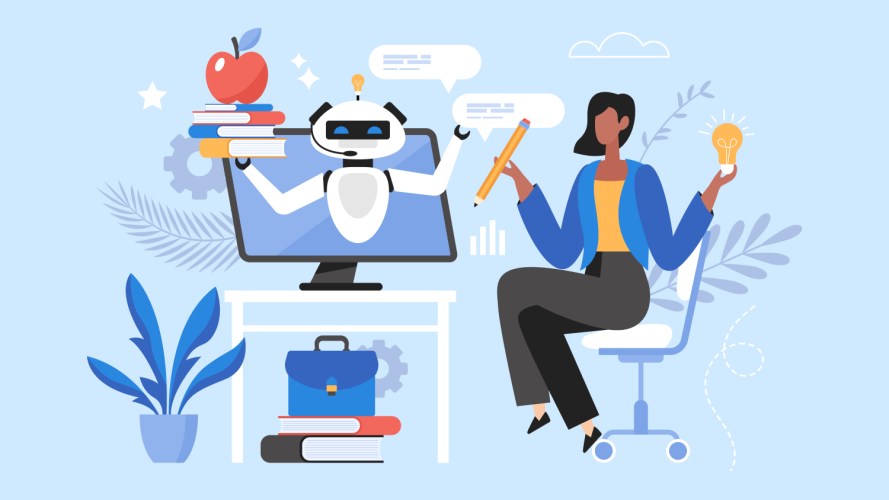AI Education: How to Reskill Your Team for the Future of Customer Experience



Strategies for building an effective training program and equipping your employees to work alongside AI.
The world of customer service, or customer experience (CX), is changing fast. And artificial intelligence (AI) is playing a big role in that transformation, not only in automating tasks but also in reshaping how teams approach problem-solving. As customers expect faster, more personal, and helpful service, businesses must invest in AI education to empower their teams with the skills and knowledge to harness this technology effectively. Upskilling teams in both CX strategies and AI tools is key to staying competitive and meeting these new demands.
Why now is the time for AI in customer service
AI isn’t just a trend — it’s changing the way companies help customers. It can help teams solve problems faster, make better recommendations, and give customers what they need before they have to ask. By implementing AI into your customer experience strategy, you can future-proof your team and help your organization stay competitive.
Discover Agentforce
Agentforce provides always-on support to employees or customers. Learn how Agentforce can help your company today.


How AI is already changing customer success
- Personalized service: New insights into customer data can help predict what each person needs and suggest products or solutions that fit them best.
- 24/7 help: AI agents can answer questions any time of day, freeing up your team to work on the more complex interactions.
- Improved customer feedback: Analysis of real-time customer feedback helps teams know what’s working and what’s not, making it easier to improve experiences as they happen.
- Easier order tracking and returns: Customers can track their orders and return items seamlessly and without human involvement.
- Better pricing: Dynamic pricing can help meet the needs of each customer, giving them tailored deals while accounting for market changes.
- Fast problem solving: Companies can identify and fix bugs, mistakes, or problems before customers notice them.
- VIP service for loyal customers: AI can identify top customers and make sure they get VIP treatment and professional service.
- Smarter interactions: Companies can gauge the opinions of an individual customer using individual sentiment analysis. This enables companies to better understand customers’ emotions, leading to more thoughtful and timely responses and better customer service.
AI education for exceptional CX
Getting started with AI means reskilling your team to feel confident in using it. This process takes time, but it’s worth the effort. And as your team’s AI literacy grows, they’ll start identifying new ways to use the technology.
Here’s how to build an effective training program for AI skills and encourage employee engagement.
Deploy AI agents with confidence
Get the blueprint to fast-track your Agentforce implementation and drive long-term success.



Assess current skills
Identify knowledge gaps, skill gaps, and areas for improvement. Make sure you address core AI literacy and technical skills as well as soft skills that support success with AI tools.
AI literacy and technical skills:
- Foundational AI knowledge: Help your team understand the basics of AI, like machine learning, natural language processing (NLP), and predictive analytics.
- Data analysis: Train your team, as they become more familiar with AI, to understand AI insights and use data to make smart decisions.
- AI tool proficiency: Offer hands-on training with AI-powered CRM systems, chatbots, and other tools they’ll use in their daily routine.
- AI-driven customer journey mapping: Show them how to use AI to map customer journeys and improve personalization for better customer experiences.
- Customer data privacy and security: Ensure your team is equipped to handle customer data securely and responsibly while benefiting from AI insights.
Soft skills:
- Critical thinking: Encourage critical thinking, so your team can evaluate AI outputs and make informed decisions when needed.
- Adaptability: Create a culture that embraces learning and tech adoption to keep pace with evolving AI.
- Emotional intelligence: Stress the importance of empathy and the human touch in customer interactions, as these skills complement AI capabilities. It’s all about balance.
- Collaboration, not replacement: Train your team on when to rely on automation and when a human touch makes all the difference.
By empowering your team with these skills, you’re preparing them for the future of AI. They’ll be confident, skilled, and ready to deliver awesome customer experiences every step of the way.
Develop tailored training
Create personalized learning paths to address the range of AI skills required for your organization and where team members currently stand. This will help your team focus on what’s relevant to them, speed up improvements, and secure buy-in as team members see themselves in your approach to AI adoption. Hold regular check-ins to assess progress and adjust what topics and resources come next.
AI education in action
Give your team the opportunity to practice working with AI systems in controlled environments. Mix workshops, online courses, and real-world applications to cement their knowledge in different contexts. This is an ongoing effort, giving your team direct experience as new tools, features, and methods prove to deliver more value. Free hands-on AI courses and certifications are helpful resources your teams can easily access to broaden their exposure to AI.
Encourage collaboration
Share knowledge across teams and departments. A collaborative AI approach ensures that your team adopts best practices companywide. Encourage team members to proactively share their insights and experiences using new AI tools and skills. This way, different people can try out various options and keep everyone aligned and informed on what’s working and what’s not.
Reward participation
Recognize employees who embrace AI in their roles. When team members see the impact of AI on their success, engagement and competence skyrockets. Because AI is rapidly changing, it’s useful to constantly explore new ways of measuring progress and how data is understood. Participation gives your team a stake in your organization’s success with AI.
Continuous learning: The heart of AI success
Getting the most out of AI is all about having a plan for continuous learning. With technology evolving so quickly, what works today might need an upgrade tomorrow. That’s why keeping your CX team in learning mode is essential for staying competitive and delivering great experiences every day. AI isn’t a “set it and forget it” tool. It’s a journey where your team can grow, adapt, and improve.
Encourage your team to stay curious. By exploring new AI tools and techniques, they’ll keep their skills sharp and be ready to jump on the latest innovations as they appear. Regularly refreshing your training programs to reflect these advancements is key. Offer a mix of structured learning, like workshops and online courses, along with informal opportunities for peer learning and collaboration. A culture that champions learning helps your team adapt to new AI-driven solutions faster, so they’re always ready to deliver agile, responsive customer experiences.
And don’t forget to support your team along the way. Whether it’s access to the latest AI tools, time for ongoing training, or the freedom to experiment, weaving continuous learning into your organization’s AI strategy sets your team up for success. Investing in their growth means keeping them at the forefront of innovation, and equipped to meet your customers’ needs with confidence and expertise.
The future of CX with AI
Sarah Parker, SVP of Customer Success at BetterUp, recently discussed the balance between automation and human touch in customer relationships. In an Experts of Experience podcast interview, she said, “Thanks to the amount of work that comes off our plate thanks to AI. We’re no longer just executing for driving adoption, engagement, value, and customer sentiment. A lot of that busywork goes away. Now we can focus on, ‘What is our unique value proposition?’ It’s deep customer empathy because of our very nuanced and contextualized understanding of customer problems, needs, and how they’re using our solutions, which gives us a very formulated point of view of what the future of our partnership should look like.”
AI is here to stay, and when used well, it can transform the way you deliver customer experiences. By investing in your team’s AI skills, you’re empowering them to serve customers more effectively, adapt to change with confidence, and lead in a dynamic world.





























